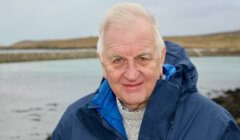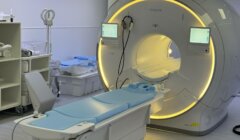Health / New hospital would need to look at long-term picture, incoming NHS chief says
Staffing and sustainability of services also on the agenda for new chief executive
THE PROSPECT of a new hospital in Lerwick is already on the agenda of NHS Shetland’s new chief executive as he prepares to start work in early January.
Michael Dickson said discussions over whether there is a case for a new Gilbert Bain Hospital need to take into account what healthcare might look like in 50 years to come – not just five years down the line.
He was speaking ahead of starting life as NHS Shetland’s new chief executive on 6 January.
Dickson, who currently lives in Brighton, has been responsible for supporting health trusts to make changes to improve services delivered to patients.
He replaces Ralph Roberts, who left the health board earlier this year to take up the chief executive post with NHS Borders.
Dickson said any new hospital would need to take into account what the long-term picture of healthcare might look like.
“We’ve got to think about if we were to build a new hospital, not what it would look like for not just five years in the future, but what would healthcare look in 50 years, and how would we build something that would meet that need,” he said on Tuesday.
“People put a lot of stock into having a physical structure, and I think it’s essential that the Gilbert Bain is given the attention that it needs. But we’ve got to do that at the same time while we don’t neglect things like mental health, social care and public health.”
Dickson said that as his background involves being a nurse, “the one thing that’s steered me through my entire career is about doing the right thing for the patient”.
Become a member of Shetland News
“What really struck me about NHS Shetland is how the organisation is set up and has responded to do the right thing for patients,” he added as he discussed why he has taken the leap to move north.
“There’s some really good examples of innovation in terms of addressing GP staffing. There’s some really good approaches to integrating between health and social care that puts the patient at the heart of how that service is delivered.
“Often those sorts of services can be quite separate and unfortunately we see this in England a lot – patients fall through the gaps.
“And it’s a beautiful place – it’s stunning. When I went up there it really reinforced to me how welcoming and kind and enthusiastic everyone that I met was. It’s a great place to live and work.”
Dickson is no stranger to working in island communities, with his CV including jobs in the likes of Cyprus and the Isle of Wight.
He admits that the finances has always been a challenge for health providers he has worked with in his career – with NHS Shetland no different as it struggles annually to meet its rising costs.
“It’s clear that wherever there are challenges there are always opportunities,” Dickson added.
“Bringing together that health and social care piece is absolutely essential, because our patients ask of us to make sure we are joined up and they don’t see any gaps between it. It also means that we can deliver our services together in a sensible way that reduces the amount of resource needed.
“The other issues are about making sure that we’ve got the right workforce to be able to deliver what we need to deliver, and Shetland is a beautiful place to be, but for some people it feels like a long way away.
“I understand why people wouldn’t necessarily think about moving to the Shetland Islands. But there’s two parts to that. One is about NHS Shetland being the best employer it can be to the people that are currently there, but also the people coming in.
“And secondly, looking at how we grow our own workforce in the future. Because a lot of people who are in school right now might not be aware they can train to be nurses, physiotherapists, dentists and doctors, and not have to spend years and years off island to come back and deliver that.”
Also on Dickson’s radar is the sustainability of services and the desire to have as much care undertaken in Shetland as possible.
“We would all really like to see everything delivered on island,” he said.
“But there are issues about that, because there isn’t the population…but where there is an opportunity to do it, we should try to do it on the island.”
Going forward Dickson said “technology absolutely has a part to play in the future, but it isn’t the answer to absolutely everything”.
Moving on to the ‘B’ word, the incoming chief executive said one of the main impacts of Brexit on NHS boards has been the lack of clarity over what the future may hold.
“Regardless of how you voted, the past three years and whatever happens in the future, Brexit creates uncertainty. And uncertainty isn’t necessarily great for planning,” Dickson admitted.
“The absolutely primary responsibility of the chief executive of NHS Shetland is making sure that people who receive healthcare get the best quality care.
“It will mean that whatever happens that we’ve got the plans in place to address some of the concerns that come up, and we’re working together as a team to address any concerns that we may have, staff may have, and most importantly patients who may be worried about their healthcare will have.
“I think at the moment until we have a clearer picture, we just have to keep on the front foot and plan for a range of eventualities.”
Become a member of Shetland News
Shetland News is asking its many readers to consider paying for membership to get additional features and services: -
- Remove non-local ads;
- Bookmark posts to read later;
- Exclusive curated weekly newsletter;
- Hide membership messages;
- Comments open for discussion.
If you appreciate what we do and feel strongly about impartial local journalism, then please become a member of Shetland News by either making a single payment, or setting up a monthly, quarterly or yearly subscription.















































































